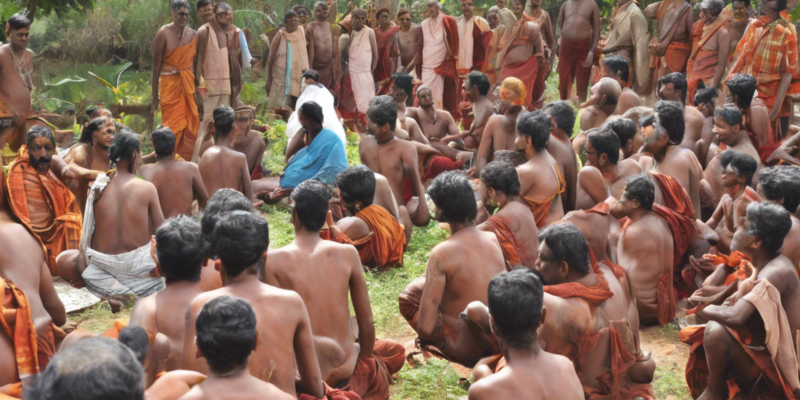Introduction
Vedanta, also known as Uttara Mimamsa, is one of the six classical schools of Indian philosophy. It represents the philosophical conclusion of the Vedas, emphasizing the concepts of self-realization, ultimate reality, and the interconnectedness of all beings. Over the years, Vedanta has evolved and been interpreted by different scholars, leading to various schools of thought within the framework of this ancient philosophy. In this article, we will delve into the latest updates in Vedanta, exploring new trends, developments, and interpretations that are shaping the landscape of this profound philosophical tradition.
H2: Advaita Vedanta
One of the most prominent schools of Vedanta is Advaita Vedanta, which was popularized by Adi Shankaracharya in the 8th century. Advaita literally means ‘non-dual,’ and this school posits that ultimate reality is non-dual consciousness or Brahman. Recent developments in Advaita Vedanta have focused on contemporary interpretations of Shankara’s teachings, applying them to modern contexts such as psychology, neuroscience, and quantum physics. Scholars and spiritual leaders are exploring how the principles of non-duality can help individuals navigate issues such as stress, anxiety, and existential dilemmas in the 21st century.
H3: Dvaita Vedanta
In contrast to Advaita Vedanta, Dvaita Vedanta asserts the duality of the individual soul (Atman) and the supreme reality (Brahman). Founded by the philosopher Madhva in the 13th century, Dvaita Vedanta emphasizes the eternal distinction between God, the individual soul, and matter. Recent trends in Dvaita Vedanta have seen a resurgence of interest in Madhva’s works, with scholars reexamining his commentaries on the Brahma Sutras and the Bhagavad Gita. This revival of Dvaita Vedanta has sparked dialogues with other schools of Vedanta, leading to fruitful exchanges and debates on the nature of reality and the self.
H2: Vishishtadvaita Vedanta
Vishishtadvaita Vedanta, propounded by the philosopher Ramanuja in the 11th century, reconciles the apparent contradictions between Advaita and Dvaita by positing a qualified non-dualism. According to Vishishtadvaita Vedanta, the individual soul is both distinct from and interconnected with Brahman. Recent developments in Vishishtadvaita Vedanta have focused on exploring the concept of divine grace (prasada) and the role of devotion (bhakti) in spiritual practice. Scholars and practitioners are delving into Ramanuja’s texts to uncover deeper meanings and practical applications of Vishishtadvaita philosophy in everyday life.
H3: New Perspectives on Vedanta
In addition to the traditional schools of Vedanta, contemporary scholars are offering new perspectives on this ancient philosophy. Interdisciplinary studies are examining the intersections between Vedanta and fields such as environmental ethics, gender studies, and social justice. By applying Vedantic principles to contemporary issues, researchers are shedding light on how this timeless philosophy can contribute to the well-being of individuals and society as a whole. Furthermore, comparative studies are exploring the connections between Vedanta and other philosophical traditions, such as Buddhism, Taoism, and Existentialism, enriching our understanding of the universal truths embedded in diverse cultural contexts.
H4: Mindfulness and Vedanta
One of the significant applications of Vedanta in the modern world is in the realm of mindfulness. By emphasizing self-awareness, introspection, and liberation from the ego, Vedanta provides a powerful framework for cultivating mindfulness practices. Scholars and meditation experts are integrating Vedantic teachings into mindfulness programs, offering individuals practical tools for reducing stress, increasing resilience, and enhancing overall well-being. The synergy between Vedanta and mindfulness exemplifies how ancient wisdom can be harnessed to address contemporary challenges in mental health and personal growth.
H4: Vedanta in the Digital Age
The advent of the digital age has brought Vedanta to a global audience through online platforms, social media, and virtual seminars. Spiritual teachers and organizations are leveraging technology to disseminate teachings, conduct virtual satsangs, and engage with a diverse community of seekers worldwide. The democratization of knowledge through digital channels has enabled individuals from different parts of the globe to access sacred texts, philosophical discourses, and spiritual practices related to Vedanta. In this digital landscape, Vedanta is evolving as a dynamic and inclusive tradition that transcends geographical boundaries and cultural barriers.
H2: Frequently Asked Questions (FAQs)
-
What is the essence of Vedanta philosophy?
Vedanta philosophy revolves around the search for ultimate truth, emphasizing self-realization, liberation (moksha), and the oneness of all existence. -
How does Vedanta differ from other schools of Indian philosophy?
Vedanta is unique in its synthesis of the teachings of the Upanishads, Brahma Sutras, and Bhagavad Gita, offering a comprehensive framework for understanding the nature of reality and the self. -
Can Vedanta be practiced by individuals of any faith or belief system?
Yes, Vedanta transcends religious boundaries and is open to seekers of all backgrounds who are drawn to its universal principles of consciousness and interconnectedness. -
What role does meditation play in Vedanta practice?
Meditation is a crucial aspect of Vedanta practice, helping individuals cultivate self-awareness, concentration, and insight into the nature of consciousness. -
How can one apply Vedantic teachings in everyday life?
By practicing self-inquiry, ethical living, and service to others, individuals can apply Vedantic principles in their daily interactions, fostering inner peace and spiritual growth.
Conclusion
In conclusion, Vedanta continues to captivate spiritual seekers, scholars, and practitioners with its profound insights into the nature of reality and the self. By embracing new perspectives, engaging in interdisciplinary dialogue, and leveraging digital platforms, Vedanta is evolving to meet the needs of a rapidly changing world. Whether through Advaita, Dvaita, Vishishtadvaita, or innovative interpretations, Vedanta remains a timeless source of wisdom and inspiration for those on the path of self-discovery and spiritual awakening. Embracing the diversity and dynamism of Vedanta, we can embark on a journey of exploration, reflection, and transformation that transcends individual beliefs and unites us in the pursuit of truth and liberation.

